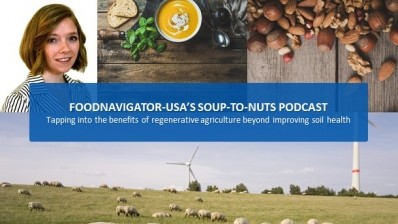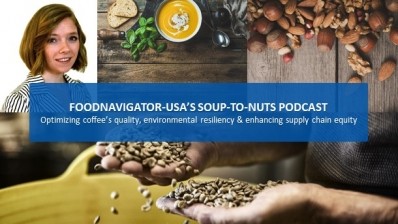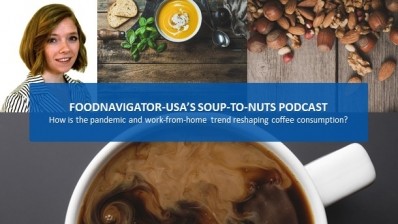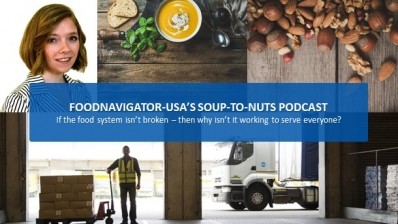Soup-To-Nuts Podcast: Rapid rise of ‘mindfulness’ creates marketing opportunities for food, beverage
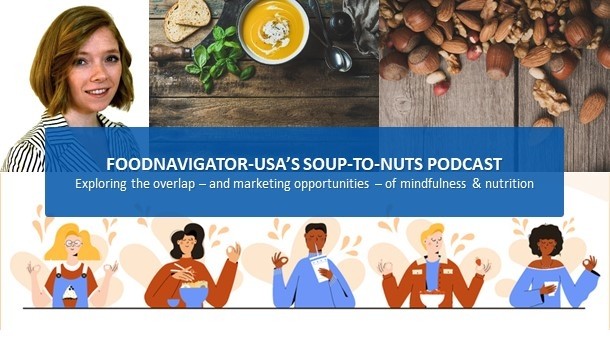
While the first few months of the pandemic might have been marked by frantic stockpiling of whatever was on store shelves, mindless snacking and a bounty of baked goods, most people quickly realized that a more intentional approach to their nutrition was necessary not only to keep off extra pounds – the so-called COVID-19 – but also to boost their immunity and support their general wellness.
Those who adopted mindfulness during the pandemic skew significantly younger, wealthier and are much more likely to have children than those who practiced before the pandemic, but according to a new report from Murphy Research both sets are more engaged with fitness and nutrition than the average consumer – making them a valuable and potentially untapped demographic for better-for-you food and beverage brands.
In this episode of FoodNavigator-USA’s Soup-to-Nuts podcast, Murphy Research’s director of syndicated research Sarah Marion shares insights from the group’s report – Mind, Body, Breath: Exploring Modern Mindfulness and its Role in Nutrition and Health. This includes guidance on how food and beverage brands can leverage the language of mindfulness and its benefits in relation to nutrition to better engage consumers and boost their bottom line without coming off as tone-deaf or offensive.
[Editor’s Note: Never miss another episode of FoodNavigator-USA’s Soup-To-Nuts podcast – subscribe now.]
Defining mindful
The idea of mindfulness isn’t new, although the speed with which the pandemic accelerated its adoption into the mainstream vernacular left a lot of room for interpreting the concept. And while this flexibility and ambiguity is in keeping with the idea of mindfulness, it also can be incredibly frustrating to brands and marketers trying to engage with practitioners.
Which is why Marion says Murphy Research tightly defined the term as it explored its rise during the pandemic, its relation with nutrition and its potential for connecting brands and consumers.
“Mindfulness can mean so many things, right? It’s a lot like the word ‘wellness,’” she said noting the term evolved during the pandemic from focusing on a way to be more efficient, productive and positive to a concept of gaining cultural awareness, stress management and letting go of what can’t be controlled in order to better focus on oneself.
Given this framework, Marion said Murphy Research defined the term as meditation, tracking mindfulness with an app, yoga for mindfulness, a gratitude ritual or journaling for mindfulness.
The expanding appeal of mindfulness
Just like the pandemic expanded the definition of ‘mindfulness,’ it also expanded who practiced it – broadening its appeal from its base among older, more religious, and less affluent women to include younger, wealthier, and less conventionally-spiritual practitioners split evenly across genders.
“The people in our study who were engaged with mindfulness basically fell into two camps, and it’s about 50-50. So, 50% of them had been practicing before the pandemic, and those folks tended to be older… had a strong female skew and their practices really revolved around prayer and religious services,” Marion said.
“The other half are all people who came to it during the pandemic and are much more likely to be younger – so a strong millennial skew and half in terms of gender,” and they have a broader interpretation of the term, she added.
Both groups heavily overlap with fitness and nutrition engaged consumers, but thinking about them from the mindfulness perspective instead of fitness and nutrition could carve a new path for engagement, Marion said.
How mindful consumers approach food and beverage
While mindful consumers are a desirable consumer segment given their high levels of engagement, likely influence over others and preference for quality over quantity – which often translates to a willingness to pay a premium price – Murphy Research report found they actually spend less on groceries than the general population because they often ‘outsource” meals by ordering takeout, going to restaurants or buying fresh and frozen prepared options.
Still, Marion explained, they are high value consumers for CPG food and beverage players – especially in the active nutrition categories and at natural, specialty and club stores.
“That includes bars, supplements, diet or eating programs, protein powder, ready-to-drink shakes or smoothies,” and at a more granular level, organic and natural foods, sustainable options and brands with missions they believe in and trust, Marion said, adding they also tend to be more focused on vegetarian and vegan diets and intermittent fasting, all of which can be tied back to a spiritual element.
Emotional management and focus/concentration offer the most potential
To better understand how consumers exercise mindfulness and how their practice influences their perception of brands, marketing and ultimately purchases, Murphy Research divided mindful consumers into five “universes” or communities with distinguished goals, triggers and activities.
Of these, Marion said, food and beverage brands likely will have the most luck appealing to mindful consumers focused on emotional management and focus or concentration.
She explained that mindful consumers in the emotion management camp are looking for help with stress, anxiety, depression and sleep – all of which are emerging claims in functional beverages and some foods, already. Consumers in the focus and concentration camp are looking for products that will boost their productivity and efficiency, with coffee being an obvious gimmie in this segment but also only the beginning.
Food and beverage brands also could make a play for mindful consumers who come to their practice for physical health and to manage chronic pain or other conditions – but Marion says this is a much smaller subsegment and it might be a better fit for the supplement industry.
Marion says the last two universes – self-improvement and spirituality – are probably best for food and beverage brands to avoid because there is too much risk of coming off as tone deaf. This caution isn’t restricted just to consumers seeking self-improvement and spiritual connections – but all mindfulness practitioners.
“Think of this as a movement and its very anti-materialist at heart, right? It’s about fulfilling yourself in ways that consumption can’t and understanding the limits of what consuming things can do for you. And so its easy … for companies to take that message and formulate it in a way that sounds really tone deaf to consumers” by putting a product forward as a solution rather than support, Marion explained.
Marion also noted that brands that reach out to mindful consumers need to offer more than a marketing campaign – they need to weave the ethos throughout the brand’s proposition because consumers will see straight through inauthentic marketing. Likewise, she cautions brands to steer clear of overtly “self-helpy” messaging that can be a turn off to consumers are looking for support but not a solution.
Those who want to delve deeper into the role of mindfulness in diet and nutrition can find the full report at murphyresearch.com, where they can also learn more about the company’s State of our Health series, which is promoted as the largest syndicated health and wellness tracker that has continuously collected detailed data from consumers around health, fitness and nutrition since 2018.
